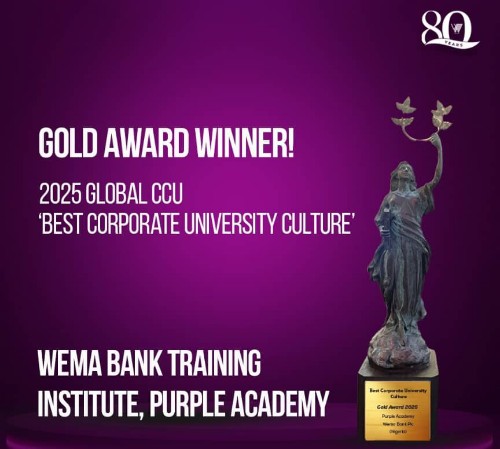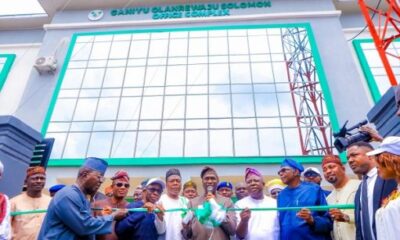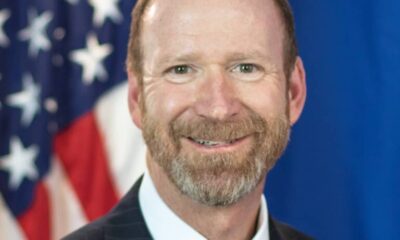- Confirmed Winner of the 2025 GlobalCCU Award for ‘Best Corporate University Culture’
Wema Bank, Nigeria’s oldest indigenous bank, most innovative and pioneer of Africa’s first fully digital bank, ALAT, has been announced the gold winner of the 2025 Global Council of Corporate Universities Awards (GlobalCCU) Award for ‘Best Corporate University Culture’. Held in Paris, on May 12, 2025, the awards recognized the bank’s training institute, Purple Academy, for its excellence and strategic impact in driving learning culture.
Hosted every two years and considered the gold standard for corporate education, the GlobalCCU Awards played host to the world’s most innovative and high-impact corporate universities, evaluating nominees through a rigorous multi-phase process led by an international jury. The award also celebrates corporate universities that demonstrate measurable value for people, business, society, and the planet.
For the 2025 edition, Wema Bank’s Training Institute, Purple Academy was shortlisted alongside leading institutions from across the world, standing out for its transformative work in human capital development, strategic business alignment, and learning innovation.
Coming in the same year the bank celebrated its 80th anniversary, this recognition reinforces Wema Bank’s legacy as a forward-thinking institution committed to building people, pioneering innovation, and redefining the future of work in Nigeria and beyond. “This win is more than just a global recognition of our learning strategy as a bank, it’s a powerful validation of what we have stood for over the past 80 years,” said Moruf Oseni, Managing Director/CEO of Wema Bank.
“At Wema, our transformation has always started with our people. Purple Academy is one of our promises in motion to equip every member of our workforce with the tools to grow, lead, and innovate as we evolve and adapt to our environment. To be globally recognized in this milestone year is a proud moment for us and everyone who has believed in our journey,” He concluded,
Speaking on why Purple Academy deserves the award, the Founder and Chairman of the GlobalCCU Awards, Annick Renaud-Coulon, shared, “Purple Academy is an outstanding Corporate University that is clearly the Best Corporate University Globally for driving a Learning Culture. It is a Corporate University that transmits, respects and preserves the Wema Bank cultural heritage and effectively evolves it as a principle which drives efficient actions. The diversity of its employees generates a high level of empathy among its stakeholders. The way it honors diversity and inclusion is brilliant to see and their leaders are so engaging when featured in internal videos. They are not only representing a great company, but also the culture of their country in the best possible way.”
Wema Bank’s Training Institute, Purple Academy, launched as a corporate university in 2022, has a beacon of learning excellence and innovation, that empowers employees at every stage of their career. The corporate university offers a dynamic blend of immersive learning experiences, personalized development paths, and forward-thinking content that addresses the evolving demands of work, life, and leadership. Through structured programs across its five key schools, including Culture, Leadership, Banking, Business, and the SME Business School, Purple Academy nurtures talent with a future-ready approach. From onboarding new hires through the Bankers-in-Training School to shaping high-impact leaders, the Academy remains committed to investing in people, promoting growth, and fostering a vibrant workplace culture aligned with Wema Bank’s legacy of innovation and excellence.
As Purple Academy continues to scale new heights and expand its influence across sectors and borders, this GlobalCCU recognition signals yet another bold chapter in Wema Bank’s story. It tells a story of a bank rooted in people, purpose, and the pursuit of excellence .


 BIG STORY4 days ago
BIG STORY4 days ago
 BIG STORY3 days ago
BIG STORY3 days ago
 BIG STORY4 days ago
BIG STORY4 days ago
 BIG STORY1 day ago
BIG STORY1 day ago
 BIG STORY4 days ago
BIG STORY4 days ago
 BIG STORY3 days ago
BIG STORY3 days ago
 BIG STORY1 day ago
BIG STORY1 day ago
 BIG STORY3 days ago
BIG STORY3 days ago























